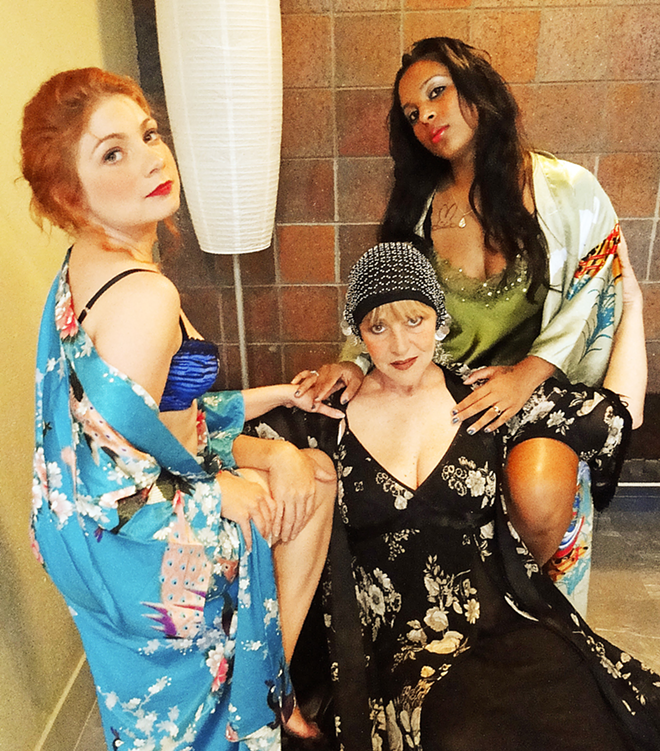
One thing you can say about local author Christen Petitt Hailey, author of Chapel Perilous: she writes distinctive dialogue. The denizens of this Chapel talk in a tough, boozy patois, peppered generously with four-letter words and body parts and in-your-face insults. If this is Florida — and Hailey tells us it is — it’s a particularly lowlife State, where the Sunshine reveals puddles of urine and vomit, the deejay is a devil-worshipper, and the drugs will probably poison you. Imagine a 90-minute poem by Charles Bukowski at his most plastered and you’ll have an idea of the atmosphere in Petitt’s reeling world. This playwright has a vision, but it’s not one you want your mother to see.
Whether it’s one you want to see is another question altogether. While something is at stake for the play’s characters in this hour-and-a-half — a hurricane’s coming, and it might wipe them all out — it’s never very clear why we should care along with them. Mae and Jake Killkenny are siblings who have inherited a dive bar and a massage parlor from their car accident-victim parents. Together with their usual crowd — including Barra the Bartender (Mae’s lover), Adam the Puke Fiend (vomit gets him off), Lady Miss E (an older, sophisticated woman) and Billy the Mute, they await Esmerelda, a Category Four storm that threatens to destroy their down-at-heel legacy.
While the radio insists that they evacuate at once, they instead swear at each other, drink liquor and smoke weed, sing karaoke, and wait for the catastrophe. There is one relationship in trouble — Mae and Barra’s, which is coming apart — but for the most part, this is a play of much language and few events, and finally, it’s tiresome. Only Mae is really sympathetic, and there’s not enough variation in the other characters’ talk to hold our attention once we’ve got the lay of the land. There are a couple of surprising appearances by the “Secret King of Tampa,” and a few very funny moments, erratically spaced, but finally we sense that, beyond presenting an atmosphere, Petitt doesn’t have much to say. The end of the play is ingenious but solves nothing.
The performances are of various types. Best of all is Nicole Jeannine Smith, who as Mae is the moral center of the drama and a genuinely complex character. Smith excels in this leading role, combining mania and anguish, and easily dominating the other strong personalities with her charismatic, kinetic presence. As her brother Jake, Jason Evans is funny and frenetic, though I find it difficult to say precisely what his purpose is, or in what way his character contributes to the play’s themes.
Paul McColgan gives one of his best performances ever as nerdish Adam the Puke Fiend, a local car dealer and loser who lusts for Mae hopelessly but doesn’t really come alive until someone’s retching, but Jack Holloway as the devil-loving karaoke jockey just walks around in a stupor, having little to do and even less to say. Jaime Giangrande-Holcom has the important role of bartender Barra, but she seems out-of-focus, emoting self-pityingly and demonstrating little besides her love for Mae; and Caroline Jett as Lady Miss E seems to understand her role a lot better than I do: after 90 minutes, I still can’t say just who she is or how she belongs. Katie Castonguay and Jessy Quinones have a few onstage moments as “Ninja Bitch Lady Assassins,” and Jonathan Carter tends bar smilingly as Billy the Mute. Director Chris Holcom does a creditable job of keeping the stage busy, and Brian Smallheer’s set could easily be a low-rent bar on the Gulf Coast. The eclectic costumes are by playwright Hailey.
As to the title of the play, I suppose it refers (beyond the portentous Tarot allusions) to the bar and its habitués. The only problem is, no one but Mae (and maybe Barra) has enough recognizable humanity to enlist our compassion, so to some degree it hardly matters how Perilous is this Chapel. Even the impressive dialogue eventually ceases to matter as we watch various stoned and drunk personages talk relentlessly at each other. Author Hailey can write a conversation; now she needs to use that talent in the service of an idea with breadth and depth, an idea that’s not exhausted after 10 minutes of drama. She’s got the virtuosity; now we want a vision that doesn’t stop unfolding after the first few exchanges.
When she can offer that, she may turn out to be one of our very best playwrights.

